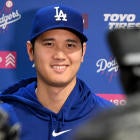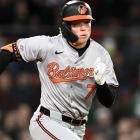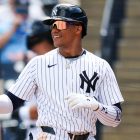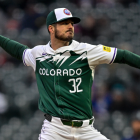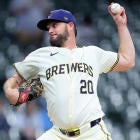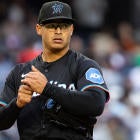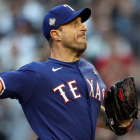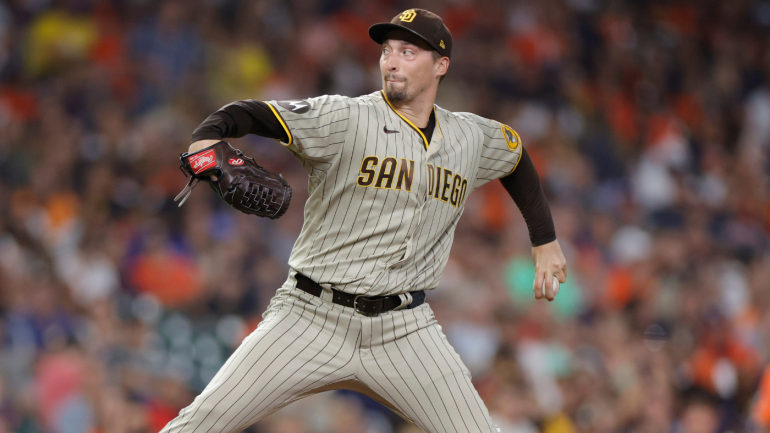
MLB Opening Day is less than two weeks away and the Houston Astros should, once again, be among the very best teams in baseball. The Astros are one year removed from a World Series title and they were one win away from their third straight pennant last year, and their fourth pennant in the last five years. Make no mistake, the goal in 2024 is another championship. Nothing less.
The Astros will open the 2024 season without Justin Verlander, who was slowed by a shoulder issue over the winter and is building up slowly this spring. They also won't get Luis Garcia (Tommy John surgery) or Lance McCullers Jr. (flexor surgery) back until midseason at the earliest. Additionally, José Urquidy exited his Friday spring start with elbow discomfort. It is no surprise then Houston remains engaged in the pitching market as Opening Day approaches.
"As I've said multiple times, we always have our foot on the gas when it comes to winning and acquiring pitching," GM Dana Brown told The Athletic on Thursday. "As long as (Blake) Snell is on the market, we check in to ask what is the latest. Nothing new as of now."
Indeed, Ken Rosenthal and Chandler Rome of The Athletic are reporting that the Astros "are engaged in a serious pursuit" of Snell. There's also this:
Blake Snell threw four simulated innings on Friday in Seattle in front of scouts from teams including the Giants and Astros, per source. Those in attendance were said to be impressed with how ready he looks.
— Mark Feinsand (@Feinsand) March 15, 2024
Snell, the reigning NL Cy Young winner, and Jordan Montgomery, who starred against the Astros in last year's ALCS, remain unsigned, and either would improve any rotation in the game. Snell is said to be a particular favorite of Astros owner Jim Crane and the Astros reportedly discussed a Snell trade with the San Diego Padres last summer. Obviously that did not come to pass.
Now 31, Snell has become underrated, not that he's without flaws. He walks too many and typically doesn't pitch deep into games, but Snell is also one of the game's great bat-missers, and he typically avoids the most damaging contact. When he's on, he's as good as anyone in the game -- Snell allowed 19 runs in his last 23 starts last season -- and can dominate any lineup.
Should the Astros sign Snell? Yes, of course. He'd make them better and that's as good a reason to sign a free agent as any. Here are four other reasons the Astros should pursue the reigning NL Cy Young winner.
1. The window may be closing
To be clear, the Astros are an excellent team, though I think it's fair to say they're closer to the end of their reign than the beginning. Verlander is 41 now. Jose Altuve, who just signed an extension, turns 34 in May. Alex Bregman will be a free agent after 2024. Kyle Tucker and Framber Valdez will be free agents after 2025. The farm system rates poorly. Cracks are forming in the foundation.
With the window possibly maybe kinda sorta beginning to close, it stands to reason the Astros want to reinforce this group as much as possible, and do as much as they can to up their odds of winning another title. Nothing guarantees a World Series win. All you can do is improve your odds, and adding Snell ups those odds. He's about as impactful an addition as the Astros can make now.
In a way, signing Snell now would be similar to adding Verlander in 2017. Were the Astros talented enough to win the 2017 World Series without Verlander? Yeah, probably, but Verlander made them even better. The same applies to the 2024 Astros and Snell. And remember, Verlander had a 3.82 ERA with the Detroit Tigers before coming over. He was hardly a slam dunk. Verlander then had red flags like Snell does now.
This section boils down to be the best team you can possibly be. The Astros are very good as it is, but there are always ways to get better, and Snell is a potential difference-making starter available at a time when Houston is trying to squeeze another title out of their core before foundational pieces age out as elite players or become free agents.
2. The contract terms could be favorable
The New York Post recently reported Snell is open to a short-term contract with opt outs a la Cody Bellinger and Matt Chapman, two other Scott Boras clients. (Montgomery is said to be holding out for a long-term deal.) This is not a situation where the Astros will have to invest heavily in Snell's decline. Even if it goes poorly, it's a short-term deal, and the problem goes away relative soon.
Bellinger received a three-year, $80 million contract with two opt outs. Chapman received three years and $54 million, also with two opt outs. High-end starters get $30 million a year these days -- $30 million would be "only" the 16th-largest average annual value for a pitcher in history -- so three years and $90 million with two opt outs seems like a reasonable enough starting point for Snell.
Snell and Boras could shoot for Trevor Bauer's three-year, $102 million contract with the Los Angeles Dodgers on the basis that Bauer, like Snell, was a recent Cy Young winner in his early 30s. Bauer's off-the-field problems are irrelevant to Snell. As far as Snell is concerned, Bauer set the market for a high-end starter on a short-term deal with opt outs.
The annual salary may be high but the term will be short, limiting the downside. That's the trade-off. The player doesn't get the big long-term payday, but he does get a real nice salary in 2024. Given how popular these short-term deals with opt outs have become, it shows teams prefer to limit the long-term risk, even if it costs more upfront. Snell is reportedly agreeable to those terms.
3. They could use more pitching
Every team could use more pitching, right? That's what makes it so hard to believe Snell and Montgomery are still unsigned. This going beyond agent Boras driving a hard bargain. At some point you have to look at the front offices and ownerships around the league, and question how serious they are about winning. There are a lot of teams on the postseason bubble that need a starter but aren't signing one.
For the Astros, Snell would provide additional depth in case Garcia and/or McCullers have a hiccup in their rehab and don't return at midseason, or Verlander's shoulder continues to bark. J.P. France had a shoulder issue of his own earlier this spring, and Cristian Javier had a 4.56 ERA with the largest year-to-year strikeout rate decline in baseball last season. Also, José Urquidy got hurt during his start Friday:
José Urquidy pulled himself from his minor league game after 43 pitches with right elbow pain, Joe Espada said. Urquidy is being seen by team trainers now.
— Chandler Rome (@Chandler_Rome) March 15, 2024
With Verlander sidelined, Houston's rotation entering 2024 will line up like so (the names are more important than the exact order):
- LHP Framber Valdez
- RHP Cristian Javier
- RHP Hunter Brown
- RHP J.P. France
- RHP Brandon Bielak
It's late enough in spring training now that Snell might not be ready in time to be in the Opening Day rotation, though he should be available a week or two into the season, at which point the Astros can move Bielak back to the bullpen. When Verlander is ready, perhaps France goes to the bullpen or Triple-A. Urquidy? Who knows. He just got hurt.
Keep in mind, though, that the Astros used a six-man rotation at times last season and have talked about doing it again this spring. Perhaps France doesn't go to the bullpen once Snell and Verlander are ready, and the Astros continue with a six-man rotation that lightens the load on Verlander, and gives everyone plenty of rest throughout the season. That's very doable.
Point is, the Astros could use more pitching in the same way every team could use more pitching, and the fact Verlander has been slowed by a shoulder issue suggests adding a frontline starter would be preferable. And if everyone manages to get healthy and stay healthy, great. That's a good problem, and this group has experience with a six-man rotation.
4. The penalties aren't as harsh
The Astros signed All-Star closer Josh Hader to a five-year contract worth $95 million contract in January, and Houston had to forfeit its 2024 second-round draft pick and $500,000 in 2025 international bonus pool money to complete the signing because Hader rejected the qualifying offer. No one likes surrendering draft picks, but to get an impact player like Hader, it's worth it.
Like Hader, Snell also rejected the qualifying offer, so the Astros will have to surrender another draft pick and more international bonus pool money to sign him. That draft pick would be a third rounder this time -- technically, Houston must surrender its second highest available draft pick to sign a qualified free agent -- though it's still another $500,000 in international bonus pool money.
The idea is that, instead of signing one qualified free agent this offseason, and another next offseason, and another the offseason after that, and continually forfeiting high draft picks, you stack your signings in one offseason. That way the Astros give up a second and third rounder rather than two second rounders, not to mention get Snell right away rather than a different player next year.
Granted, this is small beans. We're talking about forfeiting a third-round pick this year rather than hypothetically surrendering a second rounder next year. The draft pick is part of the calculus though. Other teams look at Snell and know they have to give up a second-round pick to sign him. For the Astros, it's only a third rounder, and that's a little easier to swallow.
The Hader deal pushed Houston's competitive balance tax payroll to a franchise record $259 million, per Cot's Baseball Contracts. That is well north of the $237 million CBT threshold and the Astros have rarely paid CBT over the years. Adding Snell at, say, $30 million would require running by far the highest payroll in team history, and hey, perhaps Crane is willing to do that in 2024.
The Astros don't have many obvious ways to trim payroll -- would they dare trade Ryan Pressly and his $14 million salary to make a Snell signing less burdensome? -- and at the end of the day, money will drive this decision. Either Crane will be willing to expand payroll significantly or he won't. A Snell signing may be unlikely, but it doesn't sound like the door is completely closed either, and there are plenty of reasons for the Astros to do it.














